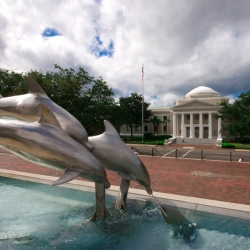
Politico reported that April 23 was the likeliest time for a special session to vote on a Seminole-Florida gaming compact.
The Florida State Legislature is considering a deal on a gambling compact which might require a special session at the end of the April. Florida’s gaming compact with the Seminole Tribe of Florida came to an end on March 31, so the tribe is not required to make $300 million in tax payments until a new compact is signed.
The Seminole tribe continues to make payments under terms of the expired gaming compact for now, the top lawmakers and Gov. Scott’s adminstration officials feel the need to make an agreement soon.
The state’s negotiators, Sen. Bill Galvano (R-Bradenton) and Rep. Jose Oliva (R-Miami), sent details of the new gaming compact to House Speaker Richard Corcoran (R-Pasco County) and Senate President Joe Negron (R-Treasure Coast), who are working on final details of the deal.
Closed-Door Negotiations
Florida’s lawmakers want to have all details worked out behind closed doors before calling the special session, which is usually what happens in such cases. Senate President Bill Galvano said not agreement on when a special session would happens has been made.
If the few differences remaining between the various sides — including the Florida Senate and House — then it is thought a special session would be called by April 30. Galvano emphasized that no final decision has been reached.
Passodomo: “The Devil Is in the Details”
State Sen. Kathleen Passodomo (R-Naples) said she is cautiously optimistic about the agreement, but urged that all sides need to have an agreement before a special session is called. Sen. Passodomo said, “The policy has been negotiated and the recommendations have been presented to the presiding officers, and that’s where we can get this done. But of course, the devil is in the details. Once you agree on the policy, if the details don’t work out, half the time the proposals don’t pass.”
McKinley Lewis, a spokesman for Gov. Rick Scott (R), said the governor “will review any proposal [lawmakers] put forward”.
In 2015, Gov. Scott negotiated a 7-year, $3 billion gaming compact, but the deal was rejected in the Republican-controlled legislature. In an election year, the governor remains noncommittal until an agreement is made.
Barry Richard Says Tribe Is Patient
Barry Richard, an attorney for the Seminole Tribe, said that his clients remain patient. Mr. Richard said, “The tribe is in no hurry to stop those payments because they depend on the state’s economy.”
Legislators have raised concerns over the past few months about the potential loss of money if the tribe stopped payments. The biggest impediment over the past three years has not been between the state and tribe, but between the House and Senate. At times, the rancor between the two sides has seemed like a partisan debate.
Leaders tried to restart negotiations over gambling laws in late 2017, becase of the billions of dollars in steady cash it would mean to Florida over the next several years. No compromise was reached, leading to the gaming compact’s expiration without a new deal.
Slot Machine Parlors
The matter is complicated, because the Seminole Tribe negotiated gaming monopolies over certain forms of gambling in the 2010 gaming compact. Since then, 8 different countries across Florida have tried to challenge the Seminoles’ monopoly, leading to lawsuits and legislative gridlock.
Miami-Dade County and Broward County approved a referendum to allow slot machine-type EGMs in local gaming facilities, which the tribe sees as a violation of their exclusivity rights. That is only one issue, though.
Designated Player Games
Designated player games or “player-banked games” are another major factor in the negotiations. In most casino table games, the casino acts as the banker — covering all that players win. For legal reasons, some states have designated player games, where a player at the table acts as the banker. This means a player covers all bets in exchange for better odds, while the casino takes a rake or vig for hosting the game and providing dealers.
It is the designated player games that could prove to be a stumbling block. Commercial operators have tried to install electronic roulette or electronic craps in their venues, claiming that the tribes’ exclusivity rights do not apply to such games. The Seminoles argue that most states’ judicial systems see electronic roulette under the law as the same as traditional roulette. California’s designated player games are cited often.
Barry Richard said the Seminoles would have to crunch the numbers on any proposal involving craps or roulette, to see if a new deal made sense to them. Richard said, “[The tribe is] very careful from a business standpoint. They would have the numbers calculated to see if it would be beneficial.”
Amendment 3 Referendum
Amendment 3, a proposed statewide referendum on the November ballot, is another issue the Seminoles are eying closely. The Seminoles and the Disney Company support the measure, which would require a statewide vote on any new changes to Florida’s gaming laws. The idea is to assure counties cannot unilaterally pass new gaming laws, such as the slots parlors and designated player games that have come up in the past few years.
John Sowinski, the president of Voters in Charge, said that he thinks the voters of Florida deserve a direct vote on such issues. The gaming activist said, “Whenever this issue comes up in Tallahassee, negotiations between the chambers seem to be more focused on coming up with a ‘deal’ that satisfies competing gambling interests than enacting solutions that are in the best interests of the people of Florida.”
